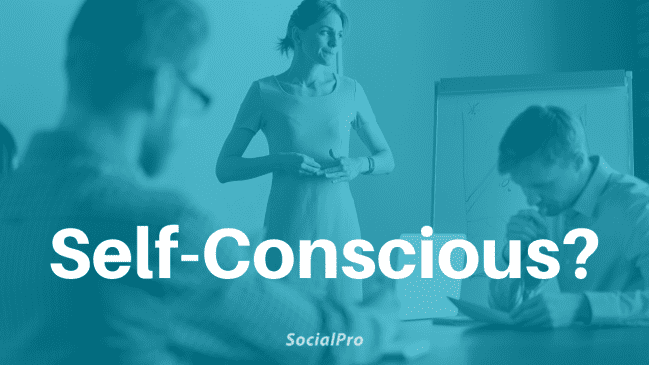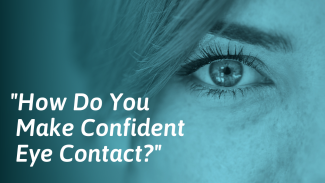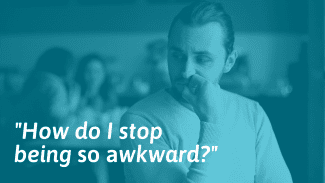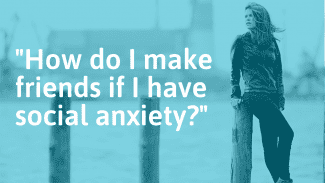If you often feel anxious and embarrassed, this guide is for you. It will give you the tools you need to be more relaxed in social settings, get out of your head and into the conversation.
This guide is for anyone who’s feeling overly self-aware, but examples are geared toward adults in work or at college.
Note: Sometimes, the underlying reason for self-consciousness is social anxiety. If this is the case for you, here’s our list of the best books on social anxiety.
Let’s get started!
1. Focus on someone or something
Self-consciousness comes from being overly concerned with how people see us. We worry that we won’t be seen as smart, attractive, or that others are judging us.
It can be exhausting, and with too little evidence to support the argument in either direction, we go straight to the most negative conclusion.
To get out of this pessimistic mindset, try shifting your attention to the people around you and your environment.
Focus not on what others think of you but on learning about the people you’re with. Make it a point to find out one thing about every person you meet. It could be their job, their major, or what they did on the weekend.
The objective is to get out of your head. Put that energy into the people around you rather than into feeding an inner dialogue that’s holding you back.
2. Question your inner critical voice
It’s easy to believe the negative voice inside our head is always right. But have you tried questioning it? You might find out that it has little to do with what’s real.
Check the evidence from your life:
Can you recall a time you did something that proves your inner critic wrong? For example, if your voice says, “I always mess up around people,” remind yourself of a time when you did just fine.
Ask yourself if what you are feeling is reasonable. Or, are you letting a perception you think others have of you, run the story in your head?
3. Know that people notice you less than you think
In an experiment, students were asked to wear an embarrassing t-shirt.
By the end of the day, the students who wore the shirts estimated that 46% of the class had noticed. When polled, only 23% of their mates actually had.[1] In other words, their embarrassing t-shirt was only half as noticeable as they had thought.
What feels mortifying to us is usually having little to no impact on others. People are caught up in their own thoughts and struggles, too busy to worry about ours. The best thing we can do is remind ourselves that no one cares as much as we do, and even our own filter is not a perfect lens.
4. Know that it’s OK to say some stupid things
I remember talking to a girl I was crushing on when I was in high school. She was talking about how her brother liked a band, and like a crazy person, I said, “Ya, I know.” Like somehow, I knew what group her brother liked. My crush looked at me strangely but kept going.
Did it make any difference to my crush? Not really. At this point, I can laugh about it, but at the time it felt humiliating.
Try turning the tables on the situation. Would you care if someone blurted out something silly? Or would it just pass you by without giving it extra thought? It’s better to talk freely even if you say something stupid every once in a while. The alternative is to always guard yourself, and that can make you come off as stiff and aloof.
5. Don’t try to fight your feelings
Emotions tend to cling harder when we fight them and weaken when we accept them.[2]
When you are anxious, and feeling uncomfortable in a social setting, what are you thinking about? How does thinking about that make you feel? Happy, sad, nervous, jealous? What’s your body doing when you’re in your head and feeling awkward at a party? Are you sweating, jumpy, yawning a lot (a reaction to nerves)?
Simply accept how you feel rather than trying to change it.
Now focus outward. Talk to someone. Ask them how they’re doing. What brings them to this party/event? Do they know anyone? Then check your head. How do you feel when you’re talking to someone? Do you get any less nervous as the conversation goes on? If you were blushing, has it subsided yet?
Practice going back and forth between your inner thoughts and how you feel when you are talking to others. See if you feel better when you’re in your head, listening to your internal dialogue, or when you’re spending your energy on others.
6. Focus on your positive traits
This isn’t “think happy thoughts, and you’ll be fine.” Instead, you want to base your self-worth on your real, positive qualities rather than cynical and questionable self-talk. This is what we know is true:
- You have talents and abilities that give you fundamental value.
- This combination of characteristics makes you unique and memorable.
- You are worth spending time with and knowing.
Try to list your concrete skills like your mathematical ability, you’re a good writer, you’re multilingual, you’re a great cook. Then there are your personality traits. You’re kind, honest, genuine, funny, enthusiastic, etc.
Even if you can’t make a full list today, write one positive quality down every day and then review the list every week. When you have a comprehensive list, read it every day. You’re training your mind to focus on what you do well and to be able to access it quickly.
7. Make sure you’re reading the situation right
Negative experiences can teach us to be on guard and defend ourselves from criticism and hurt. This can affect how we perceive the world and the people we encounter.
Those of us who are overly self-conscious might believe the world will judge us harshly because that is what we’ve experienced. However, as I’ve pointed out, people don’t care that much about how we act or what we say. Every new person you meet thinks of you as a blank slate.
When you’re in a scary social situation, ask yourself, “Is there a chance my past experience is affecting how I’m seeing this interaction? Is there another, more realistic way I can approach his conversation?”
Believe people will be friendly, and most of the time, they will be. If not, it says more about them than you.
8. See yourself as a social observer
People watching is fascinating, and it shows us how our basic humanity makes us all messy, foolish, and funny. Go to the mall, grab a coffee/tea, and watch people walk with their friends. Listen in as they sit beside you and talk, or as they chase their kids down the hall.
Now notice their body language, their tone of voice, and eavesdrop on what they’re saying. What we’re doing is training you to switch your focus from yourself to others and to think objectively about what you’re witnessing.
Are people relaxed or stilted? Is their posture good, or are they slouching? When they talk, are they quiet, or does the volume go up and down with excitement? The more we see others being their imperfect selves, the more we’ll realize this is what ‘normal’ looks like.
Go into this observer mode when you walk into a room of strangers. It can help you be less self-conscious.
9. Assume that people will like you
This one is about the mechanics of being seen as confident rather than inhibited or self-conscious. When we feel uncomfortable, it can make us talk softer, hug our bodies with our arms, and speak faster to get the words out and move the focus off us as soon as possible. It can make us seem aloof, and even if we don’t intend to, it makes us less approachable.
Be confident and friendly right off the bat. Walk up to people with a warm smile and present yourself. If you’re uncertain about the details, look at how likable, confident people do it and learn from them. Assuming people will like you is a self-fulfilling prophecy. Assuming they won’t is, too.
10. Ask about others to take the focus off you
It’s easier to focus on someone else other than ourselves. When you meet someone for the first time, ask them what they do for fun. What are their hobbies, or do they have any pets? Listen carefully, nod, and give them signs that you are enjoying their story. Then add anything relevant that applies from your life. Things like your pets – what kind are they, their name, breed…or your hobbies. At the end of the day, you want to have a balance between learning about them and sharing about yourself.
The goal is to learn about someone else because it’s hard to be self-conscious when you’re focused on getting to know another’s interests and stories.
11. Make internal progress checks, not comparisons
Jealousy is a miserable emotion. It makes you feel small and worthless and sucks the joy out of everything. It’s like anger directed at someone else, but you are the one who feels crappy.
Avoid both overexaggerating someone else’s talents or trying to find flaws in them to make yourself feel better. No one is perfect, and tearing them down when you feel envious just retains the focus on you because you are still comparing yourself to someone else.
Here’s a thought: What if we were OK with the fact that someone is more accomplished than us? When we accept this, it helps us see ourselves differently.
Our value then has nothing to do with how successful we are or how good we are at something. We want to go from “I like myself because I’m good at…” to “I like myself.” (Period.) This makes our self-acceptance unconditional.
How do we accept that others are more accomplished than us and be OK with that? First, let that fact sink in, and allow all your emotions of envy and sadness to come to you. Accept those emotions rather than fight them. Now, you no longer need to fear them. Afterward, you will be less prone to comparisons.
Here’s another way to do it:
Instead of thinking, “Well, at least I’m better than them when it comes to X.” Say, “I’m not good at everything, which is OK because my value isn’t based on my achievements. I have value because I am 100% myself”.
Let’s talk more about how to be more self-accepting…
12. Practice accepting yourself
Self-acceptance is one of the biggest steps we take towards achieving self-confidence.
According to Aaron Karmin, MA, LCPC, a psychotherapist in Chicago, Ill, a person “who accepts [themselves] unconditionally as a worthwhile human in spite of [their] faults and imperfections does not experience the stress of self-consciousness.”.[3]
Here are some things you can do to accept yourself:
- Decide how you are going to live your life. Will you let others define your personal image, your strengths, and your weaknesses? Try to move from blame, doubt, and shame to tolerance, acceptance, and trust.
- Make a list of all your good points.
- What do you do well?
- What are you proud of accomplishing?
- Whose lives have you made better?
- Connections you’ve made with others.
- Hardships you have overcome.
Review the list often, so you see your progress and acknowledge your gifts.
- Take an inventory of the people close to you.
- Are they good for you?
- Do they reinforce negative self-talk?
- Do they criticize or demean you?
Consider eliminating all the negative influences in your life.
- Surround yourself with a positive support group of people who celebrate you.
- Forgive yourself. If you made a mistake, realize you did your best with the information you had at the time, or you simply made a bad choice. But now you chose to move on and forgive yourself.
- Silence your inner critic. Just because it’s hard to hear doesn’t mean it’s right or 100% true. If you wouldn’t talk to someone else like you speak to yourself, why is it OK to do it to you? You’re human like everyone else. Treat yourself as well as you treat anyone else, if not better.
- Move on from your unrealized dreams. You can’t change the past. All you can do is move forward and continue to pursue your current goals.
- Help yourself see how you make others’ lives better. It’s harder to see yourself in a harsh light when you acknowledge all the good you do.
- Let it go – You can’t control everything. It’s not resignation. It’s a realization that your energy is better spent elsewhere instead of railing against the things you can’t change.
- Try to solve your problems one at a time. First, step outside your head where all the worry and self-doubt resides. Take a dispassionate look at what you need to do to move past each issue. You could even try imagining that the problems you’re facing are someone else’s (if that helps you get away from your internal thoughts). Ask yourself what advice you’d give them (yourself) to help?
- Practice Self-compassion – accept your flaws and love yourself anyway. Simple words, but for most of us, it takes years, if not a lifetime to master this step. The more you do it, the better you’ll get in every respect.
- Even though you may not have much experience being kind and compassionate with yourself, you will start to believe these good things you’re telling yourself. Especially if you keep this positive internal monologue up. In many instances, it took years to get to this place of insecurity. It will likely take weeks and months to see progress and make permanent changes to your mental habits.
13. Practice thinking about other’s needs
Try doing thoughtful things for others. Consider their struggles, worries, dreams or regrets. When you do, you take the focus off yourself and you’ll connect with them. This will help you be less self-conscious.[4] It will also show others that you are caring, and you value them. Done selflessly, it will bring good things back to you.
Here are some suggestions:
- Smiling at someone after you meet them. It could be a friend, family member, or acquaintance. Let the smile happen as you talk to them, so they know you are smiling just for them because it grows after you say, ‘Hi.’
- Hold a door for someone.
- Give a spontaneous compliment.
- Bring a friend or co-worker cookies or a pre-made dinner if they are sick or need a pick-me-up.
- Pay it forward. Pay for the coffee or drive-thru meal of the people behind you.
- Keep your area tidy and organized if you work in an open-concept office.
- Send cards for different occasions or for no occasion at all.
- Give someone 100% of your attention and note what they say so you can follow up later. (Ask them how ‘it’ went. Make sure they are OK afterward.)
- Consciously spend a few minutes every day thinking of the things you are grateful for.
A word of caution: Do not do these things to gain others’ approval. That puts the focus back on you. Do it out of sincere consideration for others. The purpose of the exercise is to focus on others and their well-being. When you do, you’ll become more compassionate and less self-conscious.
14. Consider talking to a Therapist
If your self-consciousness is inhibiting you or is a result of social anxiety, a therapist can be helpful. Having social anxiety is more common than we think, and deciding to understand and address the effect it has on your life is brave. A Psychologist or a Therapist will help you talk through your feelings, find out where they originate from, and give you the tools to unpack them and move forward.
We recommend BetterHelp for online therapy, since they offer unlimited messaging and a weekly session, and are cheaper than going to a therapist's office.
Their plans start at $64 per week. If you use this link, you get 20% off your first month at BetterHelp + a $50 coupon valid for any SocialSelf course: Click here to learn more about BetterHelp.
(To receive your $50 SocialSelf coupon, sign up with our link. Then, email BetterHelp’s order confirmation to us to receive your personal code. You can use this code for any of our courses.)
You can also try contacting your insurance company or doctor for recommendations.












I’m afraid of being myself around those I look up to especially in school.
am just a bit overweight for my age and I feel so nervous when talking to new people. I feel like they are thinking about me is my weight and my clothes that are most times baggy and not a perfect fit.
I am not a Native English speaker so sometimes I will be getting in my head questioning myself if I pronounced it right or my grammar. Also, I feel like I sound stupid or the other person isn’t really interesting in what I have to say.
I feel like that, too. For example, when I want to comment about a picture in social media I check what I wrote like a hundred times. Most of the times I don’t even send them. It is so annoying. I look what others wrote and it seems like they don’t care at all about things I overthink all the time. I tell myself ıt’s just a comment maybe noone is going to see it but I just can’t let it go anyway.
I am 42. I spent a significant amount of time at the Hard Times Inn. I constantly feel judged, no matter the demographic. In the current socio-political paradigm, the world seems alien. I haven’t come to terms with that out-of-touch aging stage. I want to be ‘cool’ and relevant, but I also want to come into my own as an adult. I want to be perceived as fun and attractive, but most days don’t feel that. I get nervous and start getting hyper active. I overshare, I’m boisterous and seem like I’m performing more than anything. I ‘perceive’ cues that I am offputting, being judged, or gossiped about it a negative light. I tend to take this personally and it diminishes my self-esteem. I’ve been hurt and betrayed a lot so I have really bad trust issues. So in general, I feel unaccepted and unacceptable, dated, and off-putting.
I’m not a native English speaker so I’m mainly concerned about my grammar and my foreign accent. Actually I do I feel anti social with people from my own community as well, interestingly my main concern with them is my account as well, I’m from a small village in the country in originally from and ppl there have very strong accent.
I have the same problem with not being a Native English speaker as well but I just want to let you know that you should be proud of being bilingual not a lot of people can say that! And I don’t think you should worry about your accent grow to love it because that’s what makes you unique! Who cares what others think.
I am afraid of people close to me being disappointed in me and expressing contempt. This has happened in the past andI feel crucified by it.
While talking to someone about a tragic event, I feel nervous about what will the other person think. I am a slight humorous person and tend to make the atmosphere light. But when it comes to giving sympathy, I feel extremely nervous about what to speak, how to react, and this actually makes the situation worse. Although I do feel the sorrow, expressing it by words and expression is very difficult.
That is what I am afraid of also, I always feel like the other person may think I am a drama queen or something.
I am always worried that the people I am with will think that I don’t like them and don’t want to be with them but when in reality I am really enjoying their company and am just nervous. I also overthink texts that I send. I over think so much that eventually I have to send a follow up text to clear up the problem that I have created in my head.
Same……….
while texting someone I too really overthink a lot. Does it sound right.,, will the other person understand the same,, what if they miss understand me,,, all these thoughts are constantly coming into my mind.
I can relate to every comment that has been said here. I also feel nervous that I’m going to start blushing and then people will be able to tell how insecure I feel. People have occasionally commented on or pointed out my blushing, and that always makes me feel even worse.
Oh boy to I know it. I hate knowing I will probably turn red, and then it gets worse the longer I think about it
I usually consider that my story/opinion is not interesting enough, or I do not know the subject ‘well enough’ to share my opinion.. so I stay silent, even though I would like to talk.
When occasionally I start to speak in a ‘bigger’ group ( more than 2-3 people :), I hate having several person listening to me. I get extremely nervous and cut my story short to avoid the attention.
I have exactly the same problem I also feel like I’m going to be judged on not having enough knowledge or that whatever I say doesn’t interest anyone. I’m also scared that I’m not going to get my point across. Majority of the time I just listen and reply yes/no or in very small sentences.
I really want to make good friends but I am always so awkward in any encounters I have with the people I want to be friends with. When I say something stupid I can’t stop thinking about how dumb I looked and what I could have said instead in that situation. I just feel like nobody wants to be my friend.
Same here, then when I see that person again I just watch to see if they have changed the way they act around me which may mean that they do not want to be my friend anymore, and then I get really disappointed and can not stop thinking about it.
I am just not able to gather enough courage to speak in groups. This is a problem in making friends. I am afraid of being judged by others.
I feel afraid to speak because I have had times, when conversing with someone, that my thoughts just leave me and I can’t complete the sentence. Most of the time people can’t figure out what I’m trying to say so they go talk to someone else. And I am horrible at small talk.
I’m afraid of people not finding me interesting enough. I normally shy away from group settings because Im afraid of being put on the spot or answering a question while everyone is looking at me.
It’s hard for me to talk to people when they are in in a profession that they have to know what they’re doing to do their job well. If I see someone that needs help I don’t have a problem speaking up and asking if I can help them. Out I guess I do worry at times what people think of me when I speak. An I get a look of shock or they really don’t know or understand what I’m talking about or trying to say. Then I find myself just saying oh don’t worry about it just drop it. Then I feel like crawling under a rock. At times it’s hard for me to open up about opinion because I don’t want my opinion to be shot down or have to explain my opinion. So if I don’t know enough about something I don’t give my opinion or Bring up topics that I don’t know enough about. I feel like at my age that when I ask somebody something and they look at me like you’re older than me you should know that and yes they’re probably right but maybe I really don’t know enough about it and want to know more. So I just wish people would be open to answering it or saying no I really don’t know then look at you like you’re an idiot. I have ADHD sometimes I forget I don’t retain things and I hate reading books. I’m nothing about me I hope this all makes sense to someone out there who cares.
Most of the times when am around people,I am afraid of how they are seeing me what they are thinking about my facial expression and I keep on figuring out what to contribute to what they are discussing but I feel that what I might contribute may just be useless and so I just keep quiet and listen.
M vry confident about myself when someone appreciates how I m but on the other hand I get anxious whn someone points me out about my social skills coz m introvert kinda person…at that time I too get blank and nervous wht to speak
Most of the time I’m not really worried about my looks or the dumb things I say. I’m mostly worried about the breathe and body odour
I am always worried about my looks,and feels like people will down on me
Everything you’ve written is part of my story.
I find myself afraid to even write a comment on here to strangers about what I’m afraid of being judged for. I feel like if I don’t say the exact perfect thing I will come off as stupid and irritating. I feel a lot of shame and fear about it and so I often choose to not speak at all. Sometimes when I decide to try to be more outgoing my brain feels full of fog and I often won’t even be able to think clearly which only contributes to my fears of seeming stupid.
This perfectly describes me, I feel the same way as you Kelsey. I stay quiet around others and in conversations because I’m scared what I’ll say will be stupid/judged/not acceptable. It really sucks because I feel like I can never enjoy or be in the moment with others because I’m stuck in my head with my negative thoughts.
I just get so hot in my head with the thought of having to do small talk. I have soo much social anxiety and I can’t figure out what to say. I feel like I may say something weird and people will be thinking whats wrong with this guy. So I just say Hi and keep quiet and wait for the other person to say something.
I was a super confident, outgoing person. I went through a break up when I really trusted the person and it completely shattered my confidence. I became insecure about everything. I hated the way I walked, how people always looked at me, I hate the way that I think I can tell what people are thinking about me, I hate feeling inferior to everyone, I hate that its impossible for me to talk to anyone who I feel is “better than me” whether its intelligence, appearance, or even just how happy they look. Everything seemed like a challenge. I look at my coworkers and how easily they can hold a conversation when waiting for food to finish cooking and I always wondered how that was possible. I just stumble, whisper, or say the wrong words. Its never a good feeling when im home because I talk to myself, and feeling so abnormal and like a freak.
I don’t like to ask other people questions about themselves because I think that they would think “who are you to ask me that” “It’s none of your business”, just feel like I don’t have the right, even if it’s not an intrusive or very personal question. I also don’t like it when someone looks at me a lot when they are talking to me … I can suddenly start to feel really uncomfortable or I’ll get really hot and my face will go red and then I’ll panic as it’ll be reallty obvious something is wrong with me. Life can be tricky 😉
I fear that I give the impression that I know everything or that things I say are not worthwhile or interesting comments.
Totally relate!
I am just afraid of that I speak meaningless with any of my love ones which annoys them and make me afraid of that they think wrong about me…
I’ve been really nervous about the fact that I’m constantly being judged by people in a gathering about how I look, how I’ve dressed up, the fact that my voice is not that audible and the fear that I might not sound good enough or smart enough among people present in a gathering.
Yeah, I also feel very much like you say.
I feel anxious about being too involved or being disrespectful at the same time so I end up not knowing what to say. Moving to a New country with different norms mad it worse
I am scared of speaking cos I feel I don’t make sense, I feel people see me as a confident being when am quiet but once I open my mouth, it all go away. My mind keeps telling me I should keep quiet, am not making sense, I can’t connect with people and so on. My level of social anxiety is unexplainable. I keep praying n hoping it goes away as I grow up but it still here. Am tired of being in my head all d time, am tired of crying for freedom. Let me just b free for ones. I’m beautiful n intelligent but I don’t know y this keeps hunting me. People I hv shared dis with don’t see it as a problem bcos they don’t understand.
Literally everything I do.